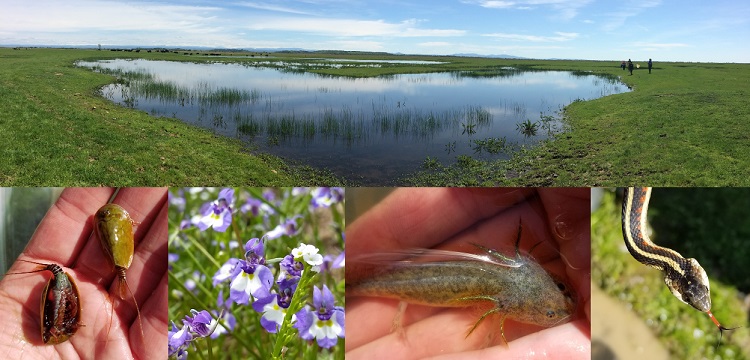CNDDB staff accompanied permitted biologists from Area West Environmental to survey for California tiger salamanders at the SMUD Nature Preserve Mitigation Bank at Rancho Seco.

Photo credit: Abigail Cramer, Rachel Powell, and Annie Chang
A couple of CNDDB staff recently volunteered to accompany permitted biologists from Area West Environmental to survey for California tiger salamanders at the SMUD Nature Preserve Mitigation Bank at Rancho Seco. Yearly monitoring visits to a mitigation site are vital to evaluating the success of restoration efforts, and often required by USFWS when approving a mitigation plan for threatened or endangered species.
The mitigation bank consists of both natural and man-made vernal pools which provide habitat for many native plants and animals, including the federally listed California tiger salamander. The California tiger salamander spends most of its life underground, only emerging after winter rains to breed and lay eggs in seasonal pools. When the SMUD mitigation bank first restored pools, California tiger salamanders were only found in pools near the margins of the restoration area, but today they can be found throughout the site.
We visited constructed vernal pools on the property to check for presence of salamander larvae and record measures of habitat quality. Not only did we find California tiger salamanders, we also observed vernal pool tadpole shrimp (federally listed as Endangered), western spadefoot (California Species of Special Concern), western toad, clam shrimp, garter snake, and chorus frog.
Thank you to Becky, Area West, and SMUD for the amazing opportunity to gain hands-on experience, and for submitting data to the CNDDB!
While much of the mitigation bank is closed to the public, the 7-mile  Howard Ranch Trail traverses portions of the SMUD Nature Preserve, showcasing beautiful natural vernal pools and oak woodlands.
Howard Ranch Trail traverses portions of the SMUD Nature Preserve, showcasing beautiful natural vernal pools and oak woodlands.